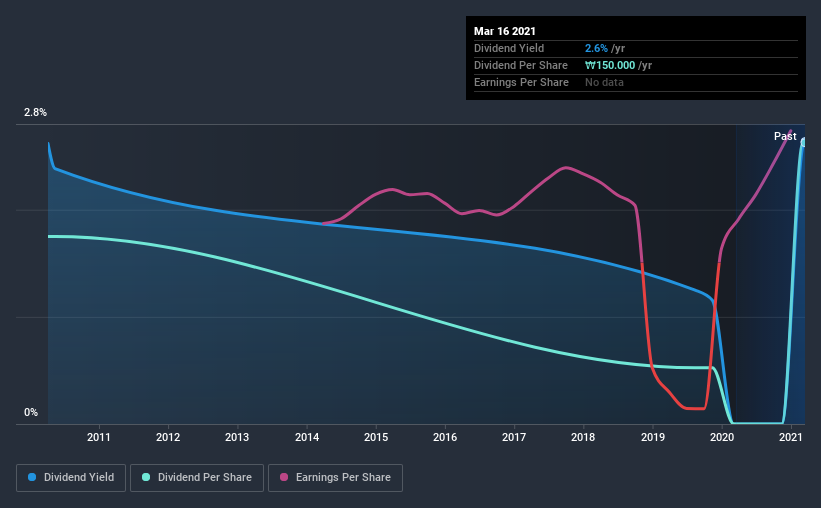- South Korea
- /
- Chemicals
- /
- KOSDAQ:A036640
HRS Co., Ltd's (KOSDAQ:036640) 2.6% Dividend Yield Looks Pretty Interesting

Could HRS Co., Ltd (KOSDAQ:036640) be an attractive dividend share to own for the long haul? Investors are often drawn to strong companies with the idea of reinvesting the dividends. On the other hand, investors have been known to buy a stock because of its yield, and then lose money if the company's dividend doesn't live up to expectations.
A 2.6% yield is nothing to get excited about, but investors probably think the long payment history suggests HRS has some staying power. The company also bought back stock during the year, equivalent to approximately 1.1% of the company's market capitalisation at the time. Before you buy any stock for its dividend however, you should always remember Warren Buffett's two rules: 1) Don't lose money, and 2) Remember rule #1. We'll run through some checks below to help with this.
Explore this interactive chart for our latest analysis on HRS!

Payout ratios
Dividends are typically paid from company earnings. If a company pays more in dividends than it earned, then the dividend might become unsustainable - hardly an ideal situation. As a result, we should always investigate whether a company can afford its dividend, measured as a percentage of a company's net income after tax. HRS paid out 26% of its profit as dividends, over the trailing twelve month period. This is a medium payout level that leaves enough capital in the business to fund opportunities that might arise, while also rewarding shareholders. Besides, if reinvestment opportunities dry up, the company has room to increase the dividend.
With a strong net cash balance, HRS investors may not have much to worry about in the near term from a dividend perspective.
Consider getting our latest analysis on HRS' financial position here.
Dividend Volatility
From the perspective of an income investor who wants to earn dividends for many years, there is not much point buying a stock if its dividend is regularly cut or is not reliable. For the purpose of this article, we only scrutinise the last decade of HRS' dividend payments. The dividend has been cut on at least one occasion historically. During the past 10-year period, the first annual payment was ₩100 in 2011, compared to ₩150 last year. Dividends per share have grown at approximately 4.1% per year over this time. The growth in dividends has not been linear, but the CAGR is a decent approximation of the rate of change over this time frame.
We're glad to see the dividend has risen, but with a limited rate of growth and fluctuations in the payments, we don't think this is an attractive combination.
Dividend Growth Potential
Given that the dividend has been cut in the past, we need to check if earnings are growing and if that might lead to stronger dividends in the future. It's good to see HRS has been growing its earnings per share at 17% a year over the past five years. A company paying out less than a quarter of its earnings as dividends, and growing earnings at more than 10% per annum, looks to be right in the cusp of its growth phase. At the right price, we might be interested.
Conclusion
To summarise, shareholders should always check that HRS' dividends are affordable, that its dividend payments are relatively stable, and that it has decent prospects for growing its earnings and dividend. We're glad to see HRS has a low payout ratio, as this suggests earnings are being reinvested in the business. We were also glad to see it growing earnings, but it was concerning to see the dividend has been cut at least once in the past. HRS fits all of our criteria, and we think it's an attractive dividend idea that would warrant further investigation.
It's important to note that companies having a consistent dividend policy will generate greater investor confidence than those having an erratic one. At the same time, there are other factors our readers should be conscious of before pouring capital into a stock. Just as an example, we've come accross 4 warning signs for HRS you should be aware of, and 1 of them shouldn't be ignored.
We have also put together a list of global stocks with a market capitalisation above $1bn and yielding more 3%.
If you’re looking to trade HRS, open an account with the lowest-cost* platform trusted by professionals, Interactive Brokers. Their clients from over 200 countries and territories trade stocks, options, futures, forex, bonds and funds worldwide from a single integrated account. Promoted
Valuation is complex, but we're here to simplify it.
Discover if HRS might be undervalued or overvalued with our detailed analysis, featuring fair value estimates, potential risks, dividends, insider trades, and its financial condition.
Access Free AnalysisThis article by Simply Wall St is general in nature. It does not constitute a recommendation to buy or sell any stock, and does not take account of your objectives, or your financial situation. We aim to bring you long-term focused analysis driven by fundamental data. Note that our analysis may not factor in the latest price-sensitive company announcements or qualitative material. Simply Wall St has no position in any stocks mentioned.
*Interactive Brokers Rated Lowest Cost Broker by StockBrokers.com Annual Online Review 2020
Have feedback on this article? Concerned about the content? Get in touch with us directly. Alternatively, email editorial-team (at) simplywallst.com.
About KOSDAQ:A036640
HRS
Engages in the manufacture and sale of silicone products in South Korea.
Flawless balance sheet with solid track record and pays a dividend.
Market Insights
Community Narratives



